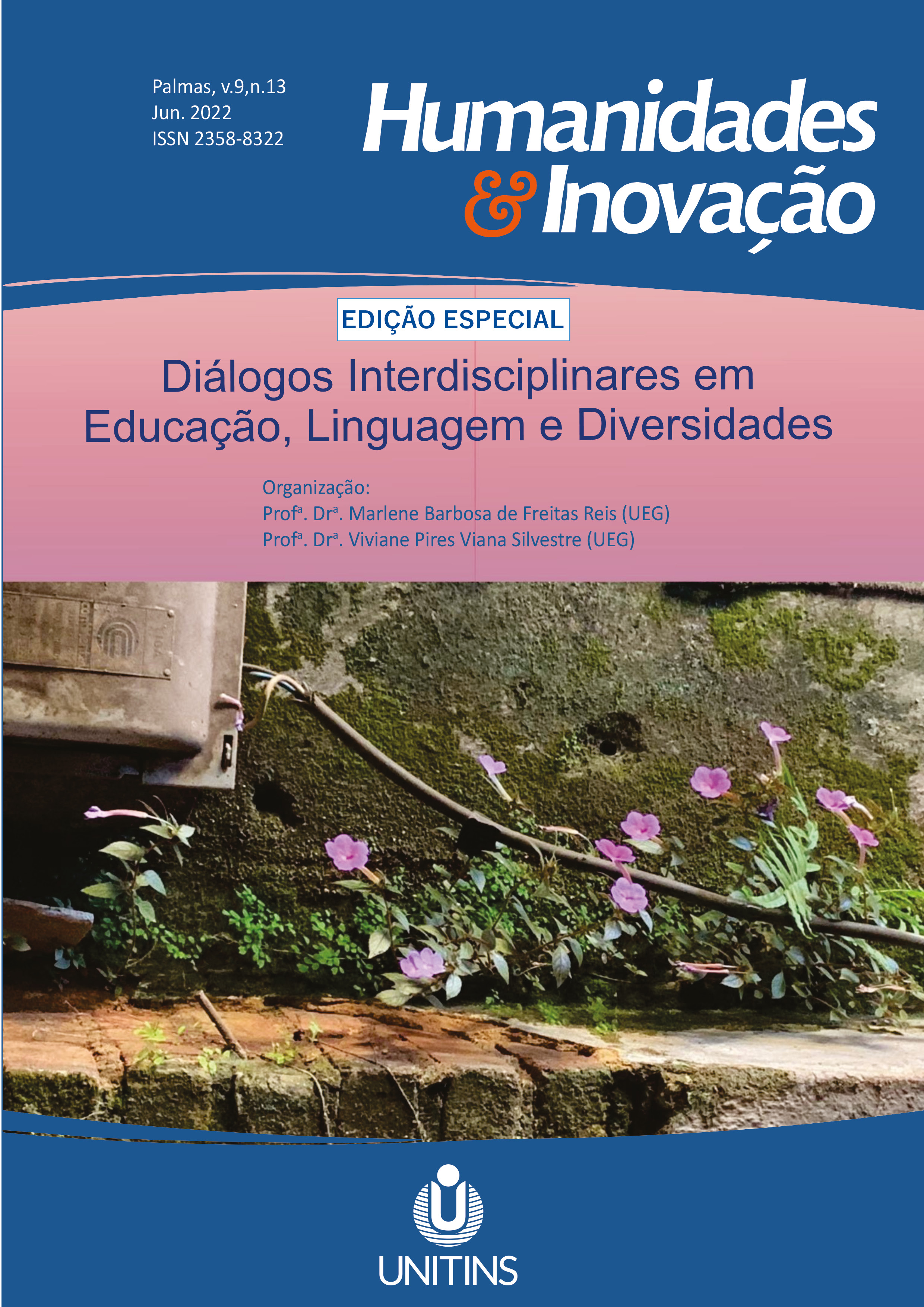PEDAGOGIA CULTURAL E LITERATURA: INTERMEDIAÇÕES POSSÍVEIS
Abstract
References
ALBUQUERQUE JÚNIOR, Durval Muniz. História: a arte de inventar o passado. Ensaios de teoria da história. 3. ed. Bauru-SP: EDUSC, 2007.
ALEXANDER, Jaqui. Pedagogies of Crossing. Meditations on Feminism, Sexual Politics, Memory, and the Sacred. 1. ed. Durham, NC: Duke, 2005.
BORTONI-RICARDO, Stella Maris. O professor pesquisador: introdução à pesquisa qualitativa. 8. ed. São Paulo: Parábola Editorial, 2008.
CANDAU, Vera Maria. Diferenças culturais, interculturalidade e educação em Direitos Humanos. Educ. Soc., Campinas, v. 33, n. 118, p. 235-250, jan.-mar. 2012. Disponível em: https://www.scielo.br/j/es/a/QL9nWPmwbhP8B4QdN8yt5xg/?format=pdf&lang=pt . Acesso em: 02 nov. 2021.
CÂNDIDO, Antonio. A literatura e a formação do homem. Remate de Males: Revista do Departamento de Teoria Literária. São Paulo, n. esp., p. 81-89, 1999. Disponível em: https://repositorio.usp.br/item/001022230. Acesso em: 02 nov. 2021.
CHKLÓVSKI, Victor. Teoria da Literatura: Formalistas Russos. Porto Alegre: 5. ed. Editora Globo, 1976.
COSSON, Rildo. Letramento literário: 2. ed. teoria e prática. São Paulo: Contexto, 2016.
DALVI, Maria Amélia; REZENDE, Neide Luzia de; JOVER-FALEIROS, Rita (Org.). Leitura de literatura na escola. 2. ed. São Paulo: Parábola, 2013.
ELLSWORTH, Elizabeth. Places of learning: Media, architecture and pedagogy. New York: Routledge, 2005.
FREIRE, Paulo. Carlos Alberto Torres, Consciência e História. A Práxis Educativa de Paulo Freire. São Paulo: Cortex & Moraes, 1979.
______. Pedagogia do Oprimido. São Paulo: Villa das Letras, 2007
______. A importância do ato de ler. São Paulo: Cortez, 2011.
FRESQUET, Adriana. Uma experiência de aprender com o cinema. 1. ed. Rio de Janeiro: UFRJ, 2007.
GIDDENS, Anthony. Modernidade e identidade. 1. ed. Rio de Janeiro: Jorge Zahar. 2002.
Gil, Antonio Carlos. Como elaborar projetos de pesquisa. 4. ed. São Paulo: Atlas, 2002.
GIROUX, Henry; MCLAREN, Peter. Currículo, Cultura e Sociedade. 1. ed. São Paulo: Corteza, 1995.
GIROUX, Henry. Os professores como intelectuais. 1. ed. Porto Alegre:Artes Médicas, 1997.
______. Cruzando as fronteiras do discurso educacional: novas políticas
em educação. 1. ed. Porto Alegre: Artmed, 1999
______. Cultural studies, public pedagogy and the responsibility of intellectuals. London: Communication and Critical/Cultural Studies, 2004.
GRAMSCI, Antonio. Quaderni del Carcere. Edizione critica dell'Istituto Gramsci, Turim: Giulio Einaudi Editori, 1975.
Hall, Stuart. A identidade cultural na pós-modernidade. 2. ed. Rio de Janeiro: DP&A, 2006.
JOUVE, Vicent. Por que estudar literatura? Tradução de Marcos Bagno e Marcos Marcio-lino. 1. ed. São Paulo: Parábola editorial, 2012.
KINCHELOE, Joe Lyons; STEINBERG, Shirley. Mudando o multiculturalismo. Buckingham: Open University Press, 1997.
SILVA, Débora Cristina Santos; ALVES, Carolina Francielle. Ensino de Literátura e Artes: Uma Página em Branco: Ensino de Literatura e Artes numa Perspectiva Pós-Colonial. I Seminário Internacional de Investigacion em Arte Y Cultura Visual, v. 1, n. 2, Montevideo. 2017. Disponível em: https://files.cercomp.ufg.br/weby/up/778/o/CulturaVisual_L3_150.pdf. Acesso em: 03 nov. 2021.
SOLÉ, Isabel. Estratégias de Leitura. 6ª ed. Porto Alegre: ArtMed, 1998.
MARTINS, Raimundo.; TOURINHO, Irene. Pedagogias Culturais. 1. ed.Santa Maria: UFSM, 2014.
RAYMOND, Willian. Hot and Cool. Penguin, 1968.
STRECK, Danilo Romeu; REDIN, Euclides.; ZITKOSKI, Jaime José. (Orgs.). Dicionário Paulo Freire. Belo Horizonte: Autêntica Editora, 2010.
TREND, Davi. Cultural Pedagogy: Art, Education, Politics. New York: Bergin & Garvey, 1992.
Copyright Notice
The submission of originals to this periodic implies in transference, by the authors, of the printed and digital copyrights/publishing rights. The copyrights for the published papers belong to the author, and the periodical owns the rights on its first publication. The authors will only be able to use the same results in other publications by a clear indication of this periodical as the one of its original publication. Due to our open access policy, it is allowed the free use of papers in the educational, scientific and non-commercial application, since the source is quoted (please, check the Creative Commons License on the footer area of this page).











